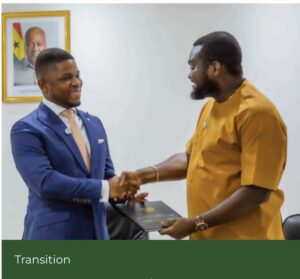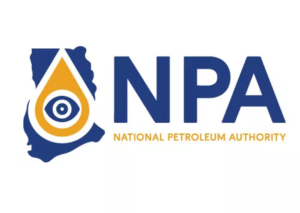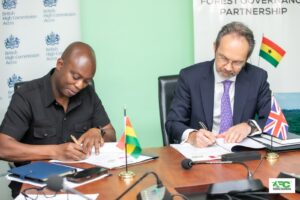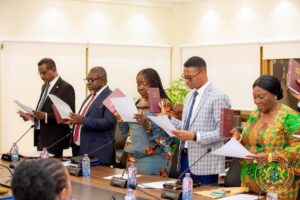
President Akufo-Addo
Prerogative of Mercy or exercise of clemency is remnants powers legally left with the President to exercise. Clemency is granted in exceptional circumstances in deserving cases involving offenses, where no other remedy exists in law to reduce severe negative effects of the sanctions.
Clemency can be requested for numerous reasons, including employment, perceived inequity, medical conditions, compassion and financial hardship.
The National Chairman of the NDC, Samuel Ofosu-Ampofo requested President Akufo-Addo to exercise this power bestowed on him as the President to waive the sanctions imposed on the over 130 radio stations across the country and grant them amnesty to aid disseminate information to the nooks and crannies in the fight against the spread of COVID-19.
In his swift response, President Nana Addo Dankwa Akufo-Addo turned the request down, argued that the stations were not closed by him, so, it is difficult for him to be the one to unlock them.
Me:
I am not raved by His Excellency’s excuse, not the reason to keep the stations close. I am not excited because, when I posted on Facebook on March 17, 2020, inviting the President to consider executing his prerogative of mercy to free some prisoners to de-congest our congested prisons, it wasn’t because he (President Akufo-Addo) is in any way involved in the imprisonment of those convicts.
For me, I would have wished he stayed in law to refuse the invitation. Because prerogative of mercy under the 1992 Constitution did not mince words on how it should be exercised. So, he could have just stayed with the dictates of Article 72 and refuse the invite.
This position I hold without malice, before all the 808 recently pardoned by President Akufo-Addo were not put in prison by him. And I am sure most of them (prisoners) if not all, got themselves into prison when he was not the President.
And that brings me to my second leg, that both the Ministry of Communication and NCA are express agents of the Executive and acting in the express capacity of the President.
The NCA reports to the Minister for Communications, who intends reports to the President, hence the President cannot act innocence of decision(s) by an agency under his ministry.
I contend that it’s the President’s duty to protect the rights and freedoms of every Ghanaian including the media in tandem with the oath he swore on his assumption of office.
I insist it’s not his place as someone who in his heydays advocated and fought for press freedom to be playing hanky-panky with the same issue when he can give oxygen to Article 162.
For the NCA, with Regulations 65 (1) of the Electronic Communications Regulations, 2011, L. I. 1991, which states that “A person shall not use a radio frequency without authorization from the Authority” is enough to clamp the ‘jaws’ of defaulting radio stations without recourse to the primary law as dictated by Article 162.
The unchanging stands by the NCA are not only regrettable but an affront to the sensibility of the framers of Article 162 clause 1 – 3. While clause (1) guaranteed the freedom and independence of the media. Clause (2) gives clause (1) legal protection from needless interference. (Subject to this Constitution and any other law not inconsistent with this Constitution, there shall be no censorship in Ghana).
Whereas clause (3) says there shall be no impediments to the establishment of private press or media; and in particular, there shall be no law requiring any person to obtain a license as a prerequisite to the establishment or operation of a newspaper, journal or other media for mass communication or information.
Need I tell you that any legislation contradicting the constitution is otiose, void and of no legal effect?
Let be known also that the use of discretionary powers the NCA act conferred on the Minister of Communications is not absolute power. Rather it’s a qualified power- subject to some qualifications – necessary, reasonable, legitimate and procedural impropriety.
For me, the framers of the Constitution did envisage these instances where an Executive arm will clothe itself with Judicial Powers, that’s why it didn’t make the requirement of license a necessity.
That is why I wonder how the Communications Minister has allowed her inherent desires and bias direct her rather than acting in just and reasonableness in her exercise of discretion?
Where’s the rule of law when the Executive arm becomes the Judge in its own matters? And how can any media house get a fair trial in a tribunal set up by the executive?
I expected her to have been more circumspect in matters involving the livelihood of citizens and not to take unilateral actions capable of jeopardizing the image of the country.
In fact, both our President and Communication minister are law advocates with high repute, but then I am surprised at the turn of events.
Was it necessary to close radio stations because they are indebted? What happened to rationality? What did we get from their closure as compared to the importance of their existence as media entities? Have we for a moment mull over the burdens of their closure?
I submit that my argument is distilled from my primary reading of the Constitution and the brief of facts of the President’s plea and the position of the law, and not because I am a Lawyer, nor a disobedient to constituted authority. And it’s my considered opinion that the penalty imposed on the radio stations is far disproportionate to the offense and a total misconstruction of the position of the law.
Let’s tread softly because everyone has a stake in the growth of the country.






